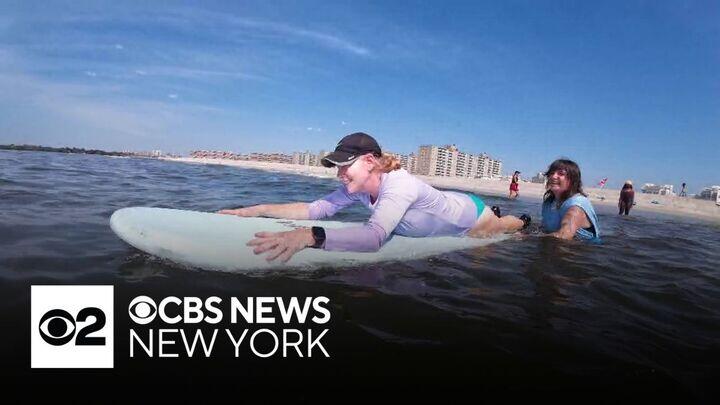Surf therapy offers tranquil setting for those dealing with mental health issues. Here's how it works.
Some people are hitting the water to deal with mental health issues.
In the latest installment in our "Breaking the Stigma" series, CBS News New York's Cindy Hsu went to the beach in the Rockaways to learn more about surf therapy.
What to know about the "Ride the Tide" program
Gina Jurlando is the founder of "Ride the Tide," which offers a unique setting for surf therapy.
"I have been a surfer my whole life. I've been in and out of traditional therapy my whole life," Jurlando said, "and sometimes I felt like I just didn't want to talk. I just wanted to do something that was calming, or, you know, talk about things in the lens of surfing."
Jurlando says surf therapy can help people who struggle with anxiety and depression, PTSD, women who've experienced sexual trauma, and even children who've experienced loss. Sessions include a land component that encompasses art, discussions and a yoga-like warmup before hitting the waves.
"Even getting to the beach sometimes can be a challenge for people dealing with certain mental health issues," surf therapy facilitator Ashley Fallon said. "We talk about challenging yourself when you're in this program, as you're comfortable, and that's what these programs can be as a way to kind of move past any blocks that you might be having."
Participants enjoy non-judgmental "safe space"
For Sharon Lew, Mick Arieta, and Narisara Vanichanan, one recent session was a day of warm sand, soft rolling waves, restorative movement and supportive affirmations.
"I really had this, like, mental, like, clarity that I hadn't had in a very long time," Lew said.
"I struggle with depression. I don't always get a chance to get out the door, right? I feel like it's in a safe space in a community that's not judgmental," Arieta said.
"It just kind of helps wash away, you know, some of the all these other emotions," Vanichanan added.
"It's just like a switch that turns on"
Therapists say surf therapy should not be a first line treatment for mental health issues, but add research supports that being in and around water does provide positive changes in social connectedness and depressive symptoms.
"At the end of the session, I feel like just more calm. It's just like a switch that turns on," Arieta said.
"It sounds corny, but feel one with it. There is just a sense of peace that happens," Lew said.
"It stays with you, for me, the rest of the day, you know? Into my relationships, into my work. I think it's part of healthy self care, which, you know, doesn't get talked about enough," Vanichanan added.
There are mental health practitioners, surf therapy facilitators and safety volunteers at all sessions. Ride the Tide has locations in Rockaway and Asbury Park, New Jersey, and a sliding scale of fees ranging from pay-what-you-can to $75 for a private, two-hour session.

